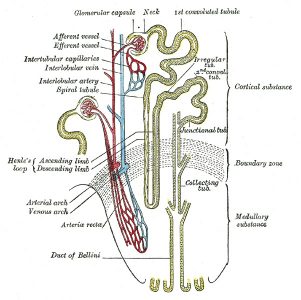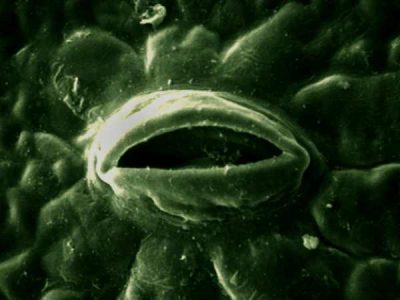Excretion Definition
Excretion is the process that biological organisms use to expel or eliminate the waste products produced by their metabolisms. In order for cells to survive, they need to perform certain biochemical reactions, as these reactions take place, some byproducts are formed which can be toxic or lethal to the cells if they are allowed to accumulate. The process of excretion collects these wastes, and rids them from the cell. In multicellular organisms, these wastes must then be excreted from the body.
Excretion is an important part of osmoregulation, or an organism’s attempts at controlling the environment within its cells. Osmoregulation is important for a number of reasons, mainly that the biochemical reactions needed for life to occur require precise conditions. Without the proper acidity and concentration of molecules, certain reactions like DNA synthesis and ATP production could not occur. Further, substances like ammonia (a byproduct of the breakdown of amino acids), can be toxic to cells.
Excretion can be compared to secretion, the process by which pheromones, hormones, and other active substances are secreted from the cell. With the process of excretion, the purpose of removing the substances from the cell is simply because the substances are waste, and sometimes toxic. With secretion, the substances themselves serve a purpose outside the cell such as coordinating growth in an organism or attracting a mate.
All organisms have some method of excretion. Excretion operates through a number of different methods, depending on the species. Unicellular organisms often have very simply methods of excretion, involving dumping wastes to the outside of the cell. Multicellular organisms have to deal with excretion on a number of fronts. After individual cells expel their waste, the waste is simply deposited into a body cavity or blood vessel. From here the excreted substances must make their way out of the body. Below are several examples of excretion in different organisms.
Examples of Excretion
Excretion in Unicellular Organisms
In unicellular organisms, excretion is quite simple. Most unicellular organisms feed through the process of phagocytosis, during which the cell membrane is folded inward to create a food vesicle. This membrane-bound package is taken into the cytoplasm of the cell, where digestive enzymes are introduced. Once the food is digested, all that remains in the vesicle are the waste products left over. Most cells then use the process of exocytosis to remove this waste. Exocytosis is simply the reverse of phagocytosis, in that the food vesicle fuses with the cell membrane and the contents are dumped on the outside of the cell.
Many freshwater protists also have a contractile vacuole. This internal organelle collects the water flowing into the cell and forces it out by squeezing the vacuole. Freshwater organisms, typically unlike marine organisms, are hypertonic to their environment. While they must maintain a high level of dissolved substances compared to the water around them, this also cause the water to flow into their cells. Excreting this water ensures they maintain homeostasis.
Excretion in Animals
While excretion does not change at the cellular level necessarily, most multicellular organisms require additional means of excretion. Some small multicellular organisms simply excrete substances through their skin, allowing them to diffuse away over time. This only works for the smallest and thinnest of organisms. Most animals, however, have specialized organs and systems designed entirely for excretion.
All animals, through the process of cellular respiration, produce water and carbon dioxide as a byproduct. Further, all animals use amino acids to build and maintain their DNA, as well as breaking amino acids down into other cellular products. While these substances can be easily excreted from cells, they become trapped inside the body without organs to excrete them. Carbon dioxide, which exists in the form of a dissolved gas, can be excreted out of the lungs or gills, as an organism respires.
Water and the broken down amino acids must be excreted another way. For this purpose, most animals have an organ or organs with tiny structures called nephridia. Nephridia are tiny tubules with specialized cells surrounding them. As bodily fluids are pulled into the tubules, they travel through different areas which are osmotically regulated to pull waste products from the fluids. In most marine animals, the main waste product created by amino acids is ammonia. Because there is an ample availability of water, fish and other marine organisms simply flush the ammonia from their systems using ample amounts of water.
Terrestrial organism do not have this advantage. If these organisms produced ammonia, they would become dehydrated trying to flush it all out. Thus, terrestrial organism often have more advanced nephridia, housed in more complex organs. Most terrestrial organism have a kidney, which houses the nephridia, as well as a liver which also contributes to filtering the bodily fluids. Terrestrial animals, use these more powerful organs to concentrate the ammonia into either urea (mammals) or uric acid (birds and some reptiles). These methods can be stored longer, without the need for as much water. The nephron system used by animals for excretion can be seen in the image below.
Still other animals have differently evolved methods of excretion. Insects, for example, have developed the Malpighian tubule system, which works similarly to nephridia, but arose independently in the history of evolution. These series of tubules, which are not contained in a blood-receiving organ such as a kidney, extend into the bodily fluid all over the body. They attach to the intestines, where they deposit waste excrements. This process of excretion is different than mammals and other familiar animals, but serves the same function.
Excretion in Plants
Plants also undergo the process of excretion. Simple, small plants excrete wastes over the surfaces of their cells. Larger, vascular plants have developed methods of excretion which involve the leaf as an excretory organ. In large vascular plants, the internal cells of the plant have no access to the outside environment. Like the cells of animals, they secrete their wastes into the intracellular spaces. Plant wastes are slightly different from animal wastes in that oxygen is the main gaseous waste product. To get rid of this oxygen, and bring in fresh carbon dioxide, plants rely on a series of openings in the leaves, called stoma. A microscopic stoma is pictured below, shown in the open position.
Through these stoma waste products can be eliminated. Also crucial in this process are the xylem and phloem, tissues within plants that allow water, sugar, and minerals to be transported around the plant. When the stoma are open, gas exchange and excretion take place. The cells from all over the plant dump their wastes into the water traveling to the leaves, which is then cast out through the stoma.
Quiz
References
- Brusca, R. C., & Brusca, G. J. (2003). Invertebrates. Sunderland, MA: Sinauer Associates, Inc.
- Pough, F. H., Janis, C. M., & Heiser, J. B. (2009). Vertebrate Life. Boston: Pearson Benjamin Cummings.
- Widmaier, E. P., Raff, H., & Strang, K. T. (2008). Vander’s Human Physiology: The Mechanisms of Body Function (11th ed.). Boston: McGraw-Hill Higher Education.


